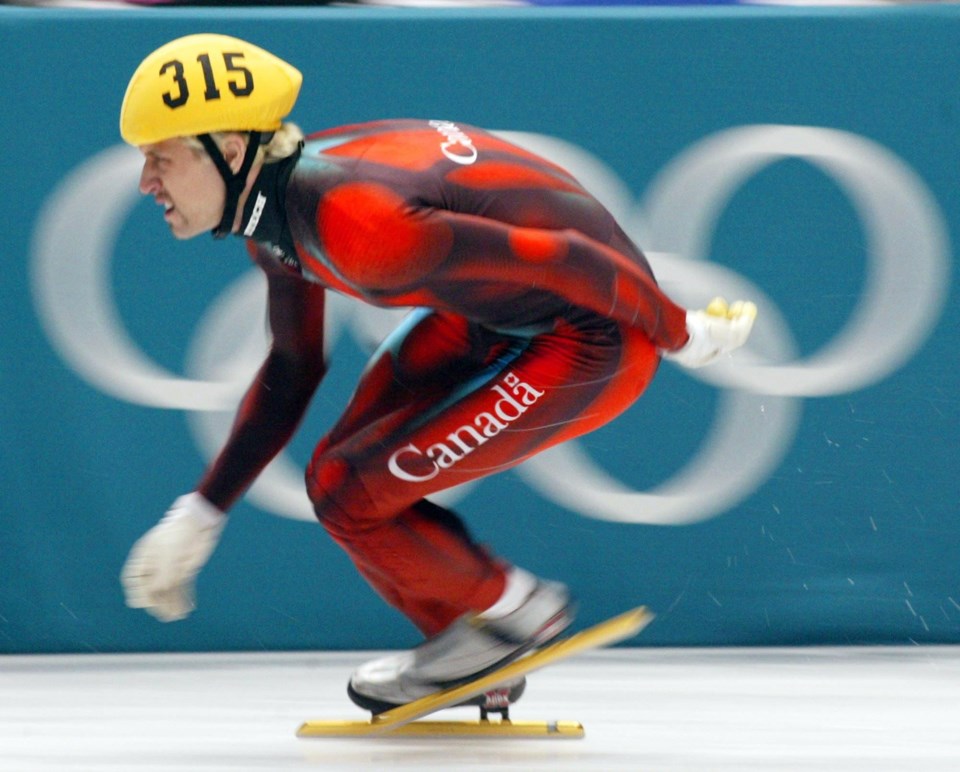BEIJING — When Marc Gagnon announced his retirement from back in 2002, he never thought he'd pull his skates back out eight years later to become a coach -- let alone return to the Olympics.
But 20 years after his triumph in Salt Lake City, he's back at the Beijing Olympics as the assistant coach of the short-track speedskating team.Â
"The first years after my retirement, I really wanted to disconnect," Gagnon told The Canadian Press in a phone interview in Beijing. "I retired at the top. I could have had years ahead of me if I'd wanted to stretch it out -- positive years or declining years, it doesn't matter."
Gagnon said he opened a gym and would often run into fellow former speedskater -- and current Quebec junior education minister -- Isabelle Charest, who had done the same.Â
"The number of times we asked ourselves if we'd start skating again, it was crazy," he said. "I really needed to be away from that."
Gagnon, now 46, said he needed a break from the sport because his obsession with victory exhausted him. He left the Salt Lake City Olympics as Canada's most decorated Winter Games athlete, with five medals, including three gold.
For eight years, he pursued different business opportunities, including with Énergie Cardio gym and the Cage aux Sports chain. During this time, he was offered coaching opportunities but always turned them down. It took getting a call from his friend and former teammate, Jonathan Guilmette, to get him back in the arena.
Gagnon has said he would have likely never stopped skating if he hadn't retired when he did, and the skating bug returned nearly as soon as he stepped back on the ice.
"Jonathan called me one morning in 2010 and sold me on it in the right way, by telling me to come coach with him, and that it wouldn't interfere with my days of managing businesses," he said.
He told himself he'd give coaching a year, with a plan to return to what he'd been doing if he didn't enjoy it.
"After two weeks, I was sold," he said. "I knew it was what I wanted to do. I started talks to sell my businesses."
As part of his journey, Gagnon spent six years at the Short Track Speed Skating Canadian Regional Training Centre in Montreal. He graduated to the national team in January 2021.
"I was happy where I was and I liked coaching," he said. "On the other hand, I'd be a liar if I said I didn't like my current position because I was a performance guy when I was an athlete.
"To find myself with these athletes who resemble the skater I was during the last 10 years of my career, for sure it's even more interesting and rewarding."
Gagnon's Olympic debut as a trainer came Saturday, at the Capital Indoor Stadium, where he won his first world title in 1993.
The first part of the evening went without a hitch as the five Canadian skaters in action qualified for the women's 500 metres and the men's 1,000 metres. The rest of the evening was much more difficult on Gagnon's nerves, as Canada was penalized and relegated to sixth place in the mixed 2,000-metre relay following a fall by Florence Brunelle.
"I definitely lost weight," Gagnon said of the evening. "I can definitely say that as an athlete, I was never as stressed as (Saturday)."
He said: "I realize that in all this, there isn't just the stress of not knowing how things will happen, but also a profound desire for your athletes to succeed. You don't want something to happen like what happened yesterday."
Now, he gets the chance to come full circle by giving back to the sport and sharing what made him one of the greatest Canadian athletes of his generation.Â
This report by The Canadian Press was first published Feb. 7, 2022.
Alexis Bélanger-Champagne, The Canadian Press

